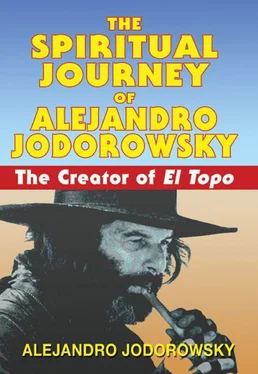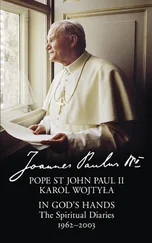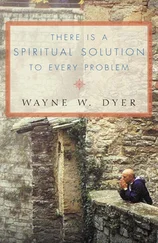When I returned to myself, I discovered illness, old age, and death.
In spite of the revelations that doña Magdalena had worked in my human organism, partly through the contact of her holy hands and fingers, I now realized that I was still identified with my mind, seeing my body, frankly, as a coffin — a beautiful coffin, certainly, full of so many riches. Nevertheless, it was not my being. It had its own life, its own mystery, its own union with the cosmos. I vegetated inside this cage, and however marvelous it might be, I was condemned to age and rot there, under constant attack from millions of microbes, viruses, inflammations, cancers. . Sleeping only forty minutes a day, eating only one bowl of rice, shut up in this dark room where the odor of incense mingled with the stench of thousands of farts and burps, my mental defenses were in ruins. I saw myself as covered with wounds, hacked, peeled, suffocated, burned, devoured, bleeding through my mouth and my anus. I imagined a thousand and one ways of dying: fires, hurricanes, floods, earthquakes, atomic bombs, leaping out of the window of a high building, filling my pockets with stones and jumping into a lake, taking a cocktail of poisons, swallowing a pound of nails, piercing my skull with a dentist’s drill, vaulting into the murderous embrace of a wild bear, being crushed by a frozen cow that falls from a freight plane, being devoured at the summit of a mountain by starving alpinists. . Finally, I came up with such complex forms of suicide that I could not help shaking with suppressed laughter. Ejo, still the block of granite, made no sign.
When I stopped laughing, time and space descended upon me. I felt the immensity of the microcosm and the macrocosm and saw myself between them like a speck of dust between two suns — so small, so small, so small, so ridiculously little, floating in this immeasurable past and this interminable future. Infinity and eternity, like two spears, were thrust through my breast; oceans of universes in expansion, imploding only to start all over again; immense galaxies that, like me, were doomed to disperse into the void. It was terrifying. In front of me and within me I saw death. What I was, what I felt, what I thought I possessed, my memory, my individuality — all went down the black hole in a few seconds. I was obsessed with three words I had read in the notes left behind by Frida Kahlo: “Everything for nothing.” In sum, no being possessed anything whatsoever. Everything was on loan to us for a few years — but in the end, all goes down the black hole. I felt caught up in a universal delirium. . In an attempt to calm myself, I focused on my shoes, those modest and useful friends with their open mouths, just waiting for my feet. An impotent rage possessed me once again: “What the devil am I doing here with this mad monk, torturing myself in this way? I’m not a samurai or a Buddha. I’m a free man. No one can oblige me to stay here any longer. That’s enough!”
It was two o’clock in the morning. I stood up, picked up my shoes, walked into the street, took a taxi, and went to Globos, a cabaret on Insurgentes Avenue where many people — actors and actresses, painters, writers, singers, politicians, drug dealers, prostitutes, and so forth — went after hours to eat and dance. A Puerto Rican band was playing. The moment I entered the place, my sense of freedom vanished into thin air. I felt like an extraterrestrial who, after a long interstellar voyage, arrives in a prison. The dancers seemed like galley slaves, going through their motions; smoking their tobacco and marijuana; ingesting their alcohol, cocaine, and pills; aware of only this tiny sliver of time and space. They seemed like walking corpses that wore masks of immortality and were chained to a deafening rhythm, accepting the world that was offered to them and swallowing it whole, imitating each other, devouring each other, carrying a burden of limitations that were transformed into solid identities. This ceiling, with its cement stalactites, blocked any possible vision of the dance of the myriad stars above. The consciousness of these people was opaque, and, in reality, each of them was tragically alone in the midst of this false festivity, sporting their sunglasses, their phallic pistols. . I saw nothing but swollen mouths and breasts, a herd of animals driven by thirst for money, power, fame.
I found a waiter, tipped him, and asked him to loan me a pair of scissors. I locked myself in the bathroom and cut off all my hair. I returned to the zendo with shaven head, but Ejo Takata had not moved. As I entered, he slowly murmured, without lifting his eyes from the ground: “Master Ummon said: ‘The world is so vast. Why, at the mere sound of a bell, do you don the clothes of a monk?’”
I removed my shoes, pants, coat, and shirt and put on a black robe that was hanging on a hook. Taking my place on the meditation cushion, I recited the response I had learned by heart. “When the king calls for us, we go immediately, without waiting for a coach. When our father calls our name, we answer without hesitation.”
As I pronounced these words, I experienced a strange acceleration of thought and this insight: to be free in a world so vast does not mean taking advantage of its many options; my freedom means to be who I am. And at that moment, I was a monk. Having responded without hesitation to my inner bell, I had no reason, sitting in this cramped room, to feel like I was a slave of this master before me.
Ejo murmured with satisfaction: “The branches of all trees hold the same moon.” At that instant, it began to rain in torrents. On the roof the drops rebounded with a deafening noise. Raising his voice in order to be heard over the din, Ejo gave me another koan: “Master Kyosho *22asked a monk: ‘What is that noise outside?’ The monk answered, ‘The sound of rain.’ Kyosho commented: ‘People live in immense disorder; they blind themselves by pursuing material pleasures.’ The monk asked him: ‘And you, Sensei?’ Kyosho replied: ‘I can understand myself almost perfectly.’ The monk asked him: ‘What does it mean, to understand yourself perfectly?’ Kyosho declared: ‘To awaken is easy. To explain it with words is difficult.’ According to the secret book, the disciple resolves this koan by hissing to imitate the sound of the rain. Will that also be your response?”
I did not reply. Instead, I arose, went outside, and allowed myself to be drenched by the rain. I returned to my meditation dripping wet, as if nothing had happened. Ejo gave a sigh of pleasure. Clearly, he had accepted my return to complete the remaining seventy-two hours of the rohatsu.
Due to lack of sleep and fatigue, my brain was functioning as if under the influence of a strong drug. The rapidity of my thoughts had a delirious energy. As soon as the master had given me that koan, I understood it in the same way that an explorer, borne aloft by a condor, understands the valley below, where he has previously walked. I was at once Kyosho, the obtuse master, and also the disciple who understands the koan by imitating the sound of rain. When the master asks about the sound outside, he sets a trap for the monk, who falls into it by answering intellectually. For Kyosho, there is no “outside” or “inside.” Because he is awake — that is, living in reality — he knows that the monastery where they are meditating is not separate from the universe, which is one. The monk feels that he is meditating in the limits of a protected, sacred space. For him, the ten thousand things of the world are separate, outside, like the sound of the rain. For the master, the noise of the rain arriving is that of the whole world, inseparable from the eternal and infinite cosmos. He tries to indicate this to the monk by speaking of the millions who live in forgetfulness of the spiritual quest. The two of them are meditating amid all of this. This is why he omits any mention of the rain itself in his seemingly absurd commentary.
Читать дальше












